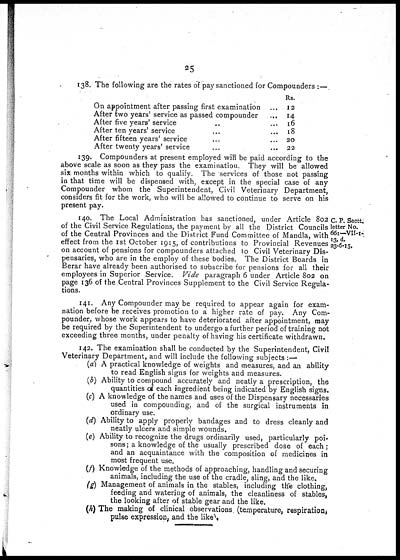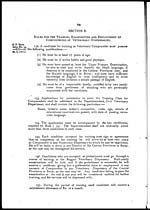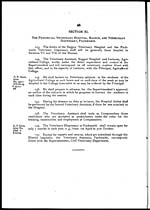Medicine - Veterinary > Civil Veterinary Departments > Manual of the Civil Veterinary Department, Central Provinces and Berar > Manual of the Civil Veterinary Department, Central Provinces
(33) Page 25
Download files
Individual page:
Thumbnail gallery: Grid view | List view

25
138. The following are the rates of pay sanctioned for Compounders:—
|
Rs. |
|
|
On appointment after passing first examination... |
12 |
|
After two years' service as passed compounde ... |
14 |
|
After five years' service... ... |
l6 |
|
After ten years' service ... ... |
l8 |
|
After fifteen years' service...... |
20 |
|
After twenty years' service... ... |
22 |
139. Compounders at present employed will be paid according to the
above scale as soon as they pass the examination. They will be allowed
six months within which to qualify. The services of those not passing
in that time will be dispensed with, except in the special case of any
Compounder whom the Superintendent, Civil Veterinary Department,
considers fit for the work, who will be allowed to continue to serve on his
present pay.
C. P. Sectt,
letter No.
661—VII-1-
13, d.
23-6-15.
140. The Local Administration has sanctioned, under Article 802
of the Civil Service Regulations, the payment by all the District Councils
of the Central Provinces and the District Fund Committee of Mandla, with
effect from the 1st October 1915, of contributions to Provincial Revenues
on account of pensions for compounders attached to Civil Veterinary Dis-
pensaries, who are in the employ of these bodies. The District Boards in
Berar have already been authorised to subscribe for pensions for all their
employees in Superior Service. Vide paragraph 6 under Article 802 on
page 136 of the Central Provinces Supplement to the Civil Service Regula-
tions.
141. Any Compounder may be required to appear again for exam-
nation before he receives promotion to a higher rate of pay. Any Com-
pounder, whose work appears to have deteriorated after appointment, may
be required by the Superintendent to undergo a further period of training not
exceeding three months, under penalty of having his certificate withdrawn.
142. The examination shall be conducted by the Superintendent, Civil
Veterinary Department, and will include the following subjects:—
(a) A practical knowledge of weights and measures, and an ability
to read English signs for weights and measures.
(b)Ability to compound accurately and neatly a prescription, the
quantities of each ingredient being indicated by English signs.
(c)A knowledge of the names and uses of the Dispensary necessaries
used in compounding, and of the surgical instruments in
ordinary use.
(d)Ability to apply properly bandages and to dress cleanly and
neatly ulcers and simple wounds.
(e)Ability to recognize the drugs ordinarily used, particularly poi-
sons; a knowledge of the usually prescribed dose of each;
and an acquaintance with the composition of medicines in
most frequent use.
(f) Knowledge of the methods of approaching, handling and securing
animals, including the use of the cradle, sling, and the like.
(g) Management of animals in the stables, including the clothing,
feeding and watering of animals, the cleanliness of stables,
the looking after of stable gear and the like.
(h) The making of clinical observations (temperature, respiration,
pulse expression, and the like.
Set display mode to: Large image | Zoom image | Transcription
Images and transcriptions on this page, including medium image downloads, may be used under the Creative Commons Attribution 4.0 International Licence unless otherwise stated. ![]()
| Permanent URL | https://digital.nls.uk/75692384 |
|---|




